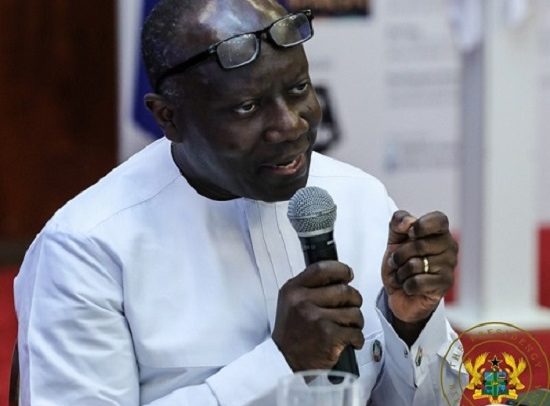GOVERNMENT HAS opened talks with the International Monetary Fund (IMF) to provide balance of payment support to the country as part of a broader effort to quicken Ghana’s build back in the face of challenges induced by the COVID-19 pandemic and, recently, the Russia-Ukraine crisis.
Minister of Information, Kojo Oppong Nkrumah, who announced this yesterday, said President Akufo-Addo had authorised Finance Minister, Ken Ofori-Atta, to commence formal engagements with the IMF to come and support an economic programme put together by the government.
“This follows a telephone conversation between the President and the IMF Managing Director, Miss Kristalina Georgieva, conveying Ghana’s decision to engage with the Fund,” the minister said in a statement.
According to the statement, at a meeting on June 30, 2022, the cabinet indicated its support for the decision.
“The engagement with the IMF will seek to provide balance of payment support as part of a broader effort to quicken Ghana’s build back in the face of challenges induced by the COVID-19 pandemic and, recently, the Russia-Ukraine crisis,” he explained.
Domestic Solutions
In May this year, the Finance Minister said the country was committed to managing its debt without assistance from the IMF, a few weeks after outlining a raft of measures to address the economic challenges.
The nation’s total public debt as at the end of 2021 stood at about 77% of the Gross Domestic Product (GDP), pushing Ghana to the brink of crisis.
The economy has come under serious pressure from rising inflation, high cost of fuel, depreciation of the cedi and high cost of living, taking away the opportunity to access the international financial markets.
In March, the Finance Minister announced a range of spending cuts as part of measures to contain inflation, reduce the public deficit, and slow the cedi from its depreciation.
After the Bank of Ghana hiked the interest rate by 250 basis points, Mr. Ofori-Atta laid out the fiscal measures at a news conference in the capital, Accra.
“The difficulties we are facing in Ghana are not peculiar to Ghana,” he said, and cited the twin issues of the impact of the COVID-19 pandemic and the war in Ukraine.
“We are confident these measures will address the short term challenges our nation is facing. We are not going to the IMF; whatever we do we are not going back, [because] the consequences are dire. We are a proud nation; we have the resources and we have the capacity so don’t let anybody tell you otherwise.
“We are not people of short sight; we are the shining star of Africa and we can do what we want to do if only we can speak that one language and ensure we burden share in the issues ahead,” Mr. Ofori-Atta stated.
He continued, “It’s about validating the programme we have in place and finding other ways of handling our debt.”
Mahama
The 2020 flagbearer of the opposition National Democratic Congress (NDC), former President John Dramani Mahama, on Thursday teased the government that it was afraid to go to the IMF for policy credibility, insisting that the Akufo-Addo administration had no option than to turn to the Bretton Woods Institution for a bailout.
Mr. Mahama said IMF bailout comes in handy since the programmes come with fiscal consolidation and fiscal discipline which can lead to some recovery and improvements.
“In the last few days, there has been talk from some regime actors about a potential or impending IMF programme. Due to the nature and depth of our economic problems, this government virtually has no other sustainable option.
“IMF programmes come with fiscal consolidation and insistence on fiscal discipline, which can lead to some recovery and improvements on the macro-economic front,” he maintained.
He added, “This government has, however, so mismanaged our economy and left it in such a terrible state that fiscal consolidation alone will not do the trick.”
NDC Era
In 2014, the NDC government led by ex-President Mahama sought financial aid from the International Monetary Fund (IMF) to help strengthen the cedi which had taken a nose-dive, depreciating 40% against the US dollar and making it one of the world’s worst-performing currencies.
The country at the time was also struggling with high inflation, aside the large current account and budget deficits, and therefore, required a bailout from the IMF, having accessed the fund in 2009, when the nation secured the $600m (£360m), three-year aid package.
BY Ernest Kofi Adu

